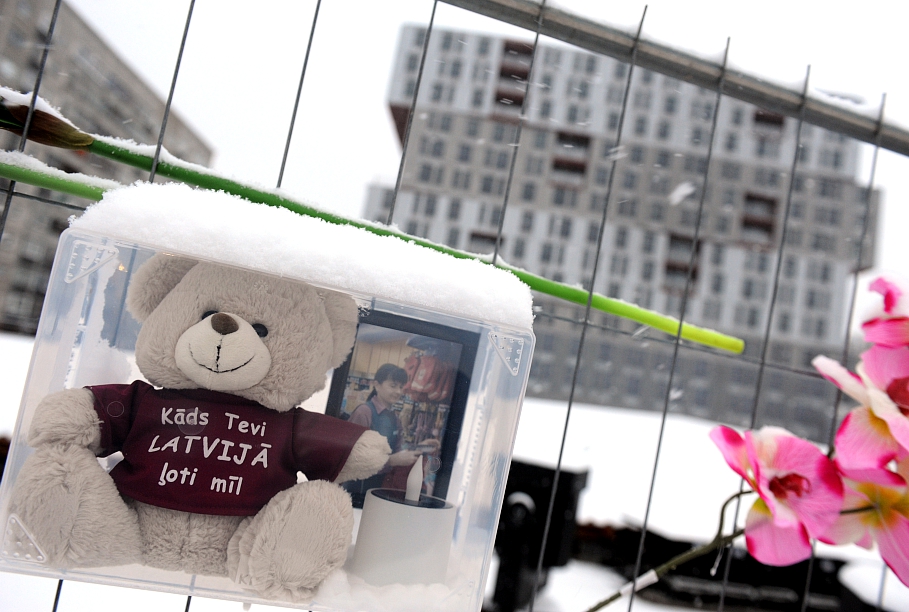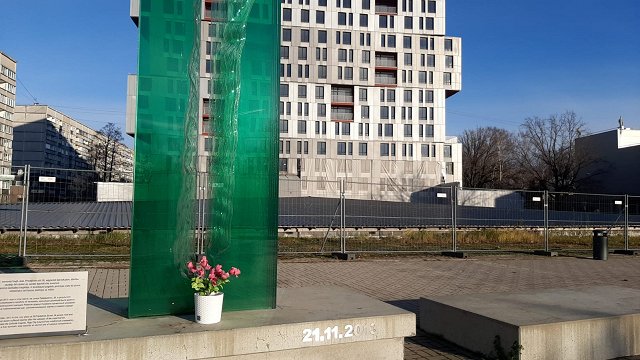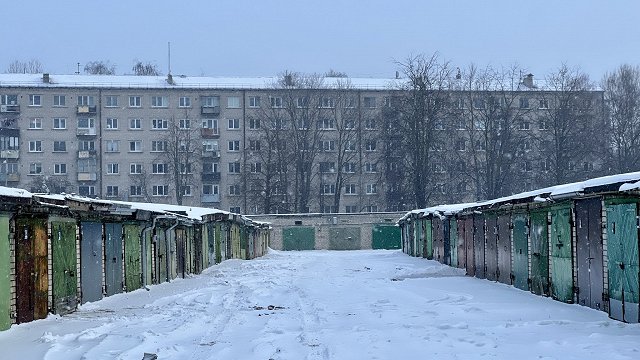Likewise the heroism of the rescuers, which was beyond compare as they went into the building knowing it was in a perilous state can have nothing new said about it. Three of them never came out and it was a minor miracle that more were not killed in the third roof collapse.
The pattern of events during those few days remains vividly impressed on all our memories but in my case at least, the chronology has become a little mixed – over perhaps 72 hours since the report of the first cave-in at the Maxima store in the Riga suburb of Zolitude anyone connected with those events in even the most tangential way must have encountered such a variety of emotions and never-before-seen sights and sounds that with the distance of a year it can seem like a horrendous dream: shrines materialising outside supermarkets, men pointing at broken bolts, flowers wedged into railings, cashiers diligently ringing up items as the building crumbled around their ears. Feelings of fear, shame and powerlessness counterweighed by acts of unexpected kindness from strangers and a nation united by universal horror.
The word 'nightmare' is over-used, but that is how it feels now: something phantasmagorical, hallucinatory. Something that, according to the laws of the universe should not be possible – but which happened anyway.
First reports failed to express the seriousness of what had occured. A roof had collapsed at a suburban shop. No confirmation of whether anyone had been injured. Not until the first television pictures were broadcast, from webcams in tiny apartments overlooking the site, did the scale of the disaster start to dawn on public and media alike.
As I was driving into Riga in a nightmarish journey to the site of the disaster my phone kept ringing. Half the calls were from friends asking if my family was safe, the other half from editors demanding quick copy and a death toll.
A few faces loom out of the dark, swirling memories.
President Andris Berzins is not a great orator. His speeches are more often than not predictable summaries of the obvious and when speaking off the cuff he has a tendency to wander off topic. But in the immediate aftermath of the event he powerfully captured the public mood. He was righteously angry. For once, you had the feeling this was the real man talking, that he had pushed aside his advisers and was speaking straight from the heart.
In headlines that flashed around the world he definitively called Zolitude “the mass murder of innocent people”. He said Latvia urgently needed foreign help to get to the bottom of what had happened. He said the people responsible needed to be held to account. Berzins understood. “He's our president, he is standing up for us,” one woman in a cafe told me.
At the other end of the scale was politician Raivis Dzintars. He just didn't get it. “The snow in Sigulda is great!” he tweeted with a big picture of himself in ski gear giving a big thumbs up as the rubble was still being pulled apart by rescue teams. When it was suggested to him that his comment plumbed new depths of crass insensitivity he retorted that he was trying to lighten the mood, to counter the “marketing of grief” by the media. And this from a party that places justifiable emphasis on not forgetting past atrocities.
In fairness the media too showed both of its extremes. At the pinnacle was LTV's Mirsolavs Kodis who seemed to be on air 24 hours a day, acting as a kind of living bridge between the Latvian and Russian communities affected by the tragedy. His dedication and sheer stamina was heroic. Time after time it was he who brought the world the real, raw emotions of the people of Zolitude, who gave them a voice in their calls for help, their calls for justice, and their wordless cries of grief and despair.
And there was the flipside: the angry calls from editors demanding more victims, more horror, more 'human interest' which all too often meant the vicarious, prying interest of one human a long way away into the human pain being experienced by those in Zolitude. At times I was nauseated, snapping at one editor: “So you actually want to hear the screams of people trapped beneath the rubble?” Her ears pricked up. “Can you hear them?” she asked.
The lowest point of all came when a colleague requested that I phone the local school in Zolitude and ask if a camera crew could film the kids observing the minute's silence, crying for their lost friends.
It made me feel sick. I decided to call the school and then immediately quit journalism. I hoped they would hurl abuse at me as I would certainly have done in their place. That would justify my decision. Instead, the soft, tired and kind voice of the school secretary said very simply: “Please don't come. Please.” I put the phone down. I was still a journalist and I hated the fact.
The one person to take responsibility – Valdis Dombrovskis – was clearly one of those bearing least responsibility. But his resignation brought in a new 'temporary' government which effectively is still in power today. Zolitude was its raison d'etre. It had nine months to get to the bottom of the Zolitude disaster. Zolitude should have been its number one priority. It should have been the only item on its action plan. At election time on October 4 it should have been able to say: “Whatever else we may have done or not done, we made Zolitude clear. Now we all understand what happened and why it happened.” That would have been an achievement.
Instead, Zolitude slid further and further down the agenda. Ranks were closed. Offers of foreign assistance were spurned as officials unconvincingly repeated that they were fully capable and that the results would be satisfactory. Now, a year later, I remember the other thing that the woman in the cafe told me: “No-one will be held responsible. They never are. They will protect each other. We're just the little people.”
The investigation continues. A parliamentary investigation committee was formed only a year after the disaster. The enquiry Riga city council promised to counter the official inquiry as not been heard from for a long time.
The finger of blame has been pointed in all directions, never resting long in one place: developers, builders, tenants, owners. No-one has been charged. No cases other than compensation claims are in court and when they do get there they will be stuck there for years. The nasty suspicion is that in the end it will be 'the system' or 'the process' that is held accountable, which is the same as no accountability at all.
It was a nightmare and the terrible thing is it feels like we may still be asleep.































